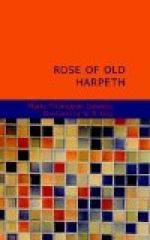“Now just look at Bob tracking down Providence Road a-whistling like a partridge in the wheat for Louisa Helen. They’ve got love’s young dream so bad they had oughter have sassaprilla gave for it,” and the poet cast a further glance at the widow, who only laughed and looked indulgently down the road at the retreating form of the gawky young Adonis.
“Hush up, Cal Rucker, and go begin chopping up fodder to feed with come supper time,” answered his wife, her usual attitude of brisk generalship coming into her capable voice and eyes after their softening under the strain of the varied emotions of the last half hour in the store. “Let’s me and you get mops and broom and begin on a-cleaning up for Mr. Crabtree before his moving, Lou. I reckon you want to go over his things before you marry him anyway, and I’ll help you. I found everything Cal Rucker had a disgrace, with Mr. Satterwhite so neat, too.” And not at all heeding the flame of embarrassment that communicated itself from the face of the widow to that of the sensitive Mr. Crabtree, Mrs. Rucker descended the steps of the store, taking Mrs. Plunkett with her, for to Mrs. Rucker the state of matrimony, though holy, was still an institution in the realm of realism and to be treated with according frankness.
Meanwhile over in the barn at the Briars Uncle Tucker was at work rooting up the foundations upon which had been built his lifetime of lordship over his fields. In the middle of the floor was a great pile of odds and ends of old harness, empty grease cans, broken tools, and scraps of iron. Along one side of the floor stood the pathetically-patched old implements that told the tale of patient saving of every cent even at the cost of much greater labor to the fast weakening old back and shoulders. A new plow-shaft had meant a dollar and a half, so Uncle Tucker had put forth the extra strength to drive the dull old one along the furrows, while even the grindstone had worn away to such unevenness that each revolution had made only half the impression on a blade pressed to its rim and thus caused the sharpening to take twice as long and twice the force as would have been required on a new one. But grindstones, too, cost cents and dollars, and Uncle Tucker had ground on patiently, even hopefully, until this the very end. But now he stood with a thin old scythe in his hands looking for all the world like the incarnation of Father Time called to face the first day of the new regime of an arrived eternity, and the bewilderment in his eyes cut into Rose Mary’s heart with an edge of which the old blade had long since become incapable.
“Can’t I help you go over things, Uncle Tucker?” she asked softly with a smile shining for him even through the mist his eyes were too dim to discover in hers.




